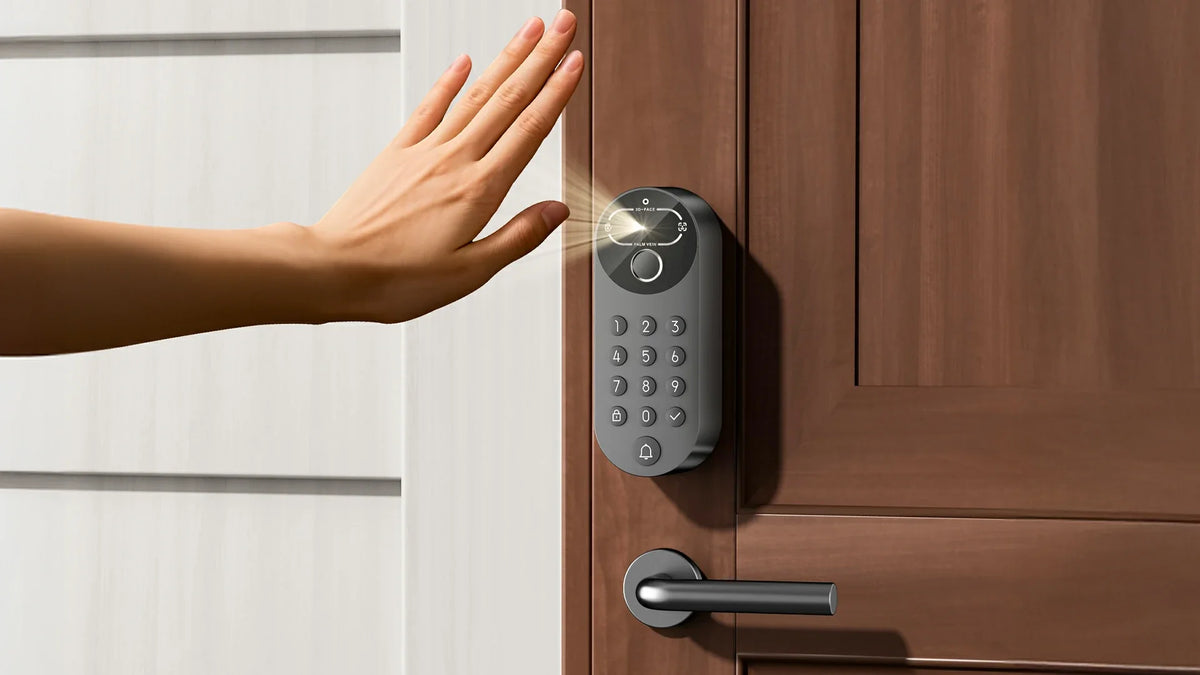
Palm Vein Smart Lock: The Future of Secure and Seamless Living Introduction: Redefining Security in a Connected World
|
|
Tiempo de lectura 4 min
|
|
Tiempo de lectura 4 min
In a world where digital transformation is reshaping the way we live, work, and interact, security remains at the forefront of innovation. From smartphones to smart homes, biometric technology is no longer a futuristic concept—it’s becoming part of our everyday lives. Among these innovations, the palm vein smart lock. is emerging as one of the most advanced, secure, and user-friendly solutions for access control.
For TCL, a global leader in intelligent technology, the integration of biometric innovations like palm vein authentication is a natural progression of its mission: “Building a Sustainable and Connected Future with Advanced Technology.” With over 40 years of innovation, TCL continues to push boundaries, and the palm vein smart lock represents yet another leap toward smarter, safer, and more connected lifestyles.
Unlike traditional locks that rely on keys, passwords, or even fingerprint recognition, palm vein smart locks use the unique vein patterns beneath the surface of your palm to verify identity. This method is virtually impossible to replicate, ensuring maximum security.
Palm vein recognition works by scanning the unique vascular pattern using near-infrared light. Since these vein patterns are located under the skin and are unique to each person, the system guarantees unmatched accuracy and security—far beyond the capabilities of traditional biometric solutions.
While fingerprints can be worn down or replicated and facial recognition can sometimes be fooled by photos or twins, palm vein authentication offers a nearly impossible-to-forge identification method. The system requires live blood flow to function, making it immune to spoofing attempts.
Imagine arriving home with your hands full of groceries. Instead of fumbling for keys or typing in a code, you simply hover your palm over the lock, and the door opens. The palm vein smart lock offers a contactless, seamless experience—perfectly aligned with modern lifestyles.
In a post-pandemic world where hygiene has become a priority, palm vein technology shines. Since it requires no physical touch, it reduces the spread of germs compared to fingerprint sensors or physical keypads.
External factors like dirt, sweat, or weather conditions can affect other biometric systems. Palm vein recognition, however, is unaffected by external wear, making it an excellent long-term solution for both residential and commercial settings.
TCL has been committed to leveraging advanced technologies to enhance daily life. Today, with operations in over 160 countries and R&D centers worldwide, TCL is at the cutting edge of innovation.
The palm vein smart lock is a reflection of TCL’s dedication to empowering people with intelligent, secure, and health-conscious solutions. By combining robust hardware design with state-of-the-art biometric technology, TCL ensures that its products not only provide convenience but also peace of mind.
Homeowners can enjoy a new level of comfort and control. Whether you live in a single-family house or an apartment, palm vein smart locks integrate seamlessly into smart home ecosystems, enabling remote management via smartphones and IoT devices.
Businesses increasingly require advanced security solutions that protect sensitive areas without slowing down workflow. Palm vein smart locks provide quick, contactless access for employees while ensuring that unauthorized entry is impossible.
In hospitals and laboratories, hygiene and security are equally important. Contactless palm vein locks help maintain sanitary environments while restricting access to authorized personnel only.
Hotels can revolutionize guest experiences by integrating palm vein access into rooms and facilities. Guests can enjoy keyless, touch-free entry that feels futuristic yet simple.
While smart locks have existed for years, most rely on passwords, PINs, or fingerprints. These methods, though useful, come with limitations:
Passwords/PINs: Can be forgotten or shared.
Keys/Cards: Can be lost, duplicated, or stolen.
Fingerprints: Prone to wear and environmental interference.
The palm vein smart lock, on the other hand, offers a high-security, contactless, and user-friendly alternative that addresses nearly all the shortcomings of previous methods.
Palm vein recognition is still relatively new in consumer markets, but its potential is enormous. As the world shifts toward fully connected smart ecosystems, we can expect palm vein smart locks to become standard in homes, offices, and public facilities.
TCL’s continued investment in research and development signals that this technology will evolve even further—possibly integrating with AI, cloud services, and broader IoT platforms. Imagine a future where your palm doesn’t just open your door but also personalizes your entire living environment—from lighting and temperature to entertainment preferences.
Like any new technology, palm vein smart locks face challenges that must be addressed:
Cost of Implementation: Advanced biometric technology can be more expensive initially.
User Awareness: Many people are unfamiliar with palm vein recognition, which means education and trust-building are crucial.
Integration Across Systems: Ensuring compatibility with existing smart home ecosystems remains an important step.
TCL, with its global presence and innovative expertise, is uniquely positioned to overcome these challenges and make palm vein technology accessible to the masses.
As technology continues to evolve, so do our expectations of security and convenience. The palm vein smart lock represents more than just another gadget—it symbolizes the next stage in intelligent living. By offering unparalleled security, hygiene, and ease of use, it redefines how we think about access control in our homes, offices, and beyond.
With TCL’s dedication to innovation, we are not just looking at a secure lock—we are witnessing the beginning of a smarter, healthier, and more connected future. The question is not if palm vein smart locks will become mainstream but when. And as we look forward, one thing is clear: the future of security is already in the palm of your hand.